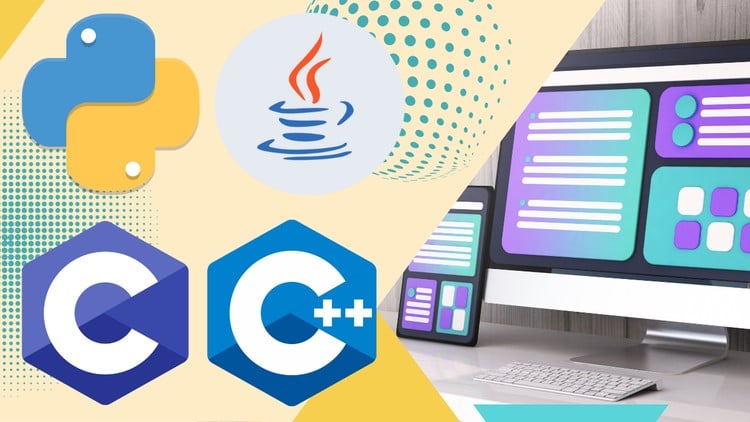
Unlock the Power of Four Languages: Complete C, C++, Java, and Python Programming Course for All Levels.
⏱️ Length: 4.8 total hours
⭐ 4.43/5 rating
👥 22,758 students
🔄 September 2024 update
Add-On Information:
Note➛ Make sure your 𝐔𝐝𝐞𝐦𝐲 cart has only this course you're going to enroll it now, Remove all other courses from the 𝐔𝐝𝐞𝐦𝐲 cart before Enrolling!
- Course Overview
- This comprehensive ‘All-in-One’ course provides an unparalleled opportunity to master four foundational and industry-leading programming languages: C, C++, Java, and Python.
- It meticulously guides learners from fundamental programming logic to advanced paradigms, designed for individuals at all experience levels, from absolute beginners to those looking to solidify their existing knowledge.
- The curriculum is strategically structured to highlight the distinct strengths and synergistic applications of each language, enabling a holistic understanding of modern software development.
- Discover how system-level efficiency, object-oriented robustness, enterprise scalability, and rapid application development converge within this integrated learning experience.
- Explore the historical evolution and contemporary relevance of these languages, understanding their core philosophies and ideal use cases across various technology sectors.
- Despite its concise delivery, the course is packed with essential concepts and practical insights, preparing you for diverse programming challenges and opportunities.
- Benefit from an updated September 2024 curriculum, ensuring the content is current with the latest best practices and industry standards.
- Requirements / Prerequisites
- A basic understanding of computer operation and file management is recommended to comfortably navigate the learning environment.
- An eagerness to learn programming and a commitment to practice are the most crucial prerequisites for success in this intensive course.
- Access to a personal computer (Windows, macOS, or Linux) with an internet connection is required for software installation and course material access.
- No prior programming experience or specialized mathematical background is necessary, as the course begins with foundational concepts.
- Be prepared to engage actively with coding exercises and implement the concepts taught to maximize learning retention and skill development.
- Skills Covered / Tools Used
- Develop computational thinking abilities, breaking down complex problems into manageable, logical steps applicable across any programming context.
- Acquire proficiency in source code compilation and interpretation processes unique to compiled (C/C++) versus interpreted (Python/Java) languages.
- Master the effective use of various Integrated Development Environments (IDEs) such as VS Code, IntelliJ IDEA, Eclipse, or PyCharm for efficient coding, debugging, and project management.
- Gain practical experience with compiler toolchains like GCC/G++ for C/C++ and the Java Development Kit (JDK) for Java, alongside the Python interpreter.
- Learn to implement robust error handling and debugging techniques across different language ecosystems, fostering resilient code development.
- Cultivate strong algorithmic design skills, understanding how to select and apply appropriate data structures and algorithms for optimal performance.
- Build a foundation in cross-platform development principles, appreciating how languages like Java and Python facilitate broader application reach.
- Understand the nuances of memory management from manual allocation in C/C++ to garbage collection in Java and Python, enhancing system performance awareness.
- Apply sophisticated software design patterns and architectural considerations, moving beyond basic syntax to structured, maintainable code.
- Develop skills in version control basics (e.g., using Git for tracking changes), although this might be an implied rather than explicitly taught tool for such a short course.
- Enhance your capability to read, analyze, and refactor existing codebases, a critical skill for collaborative development and project maintenance.
- Benefits / Outcomes
- Emerge as a versatile programmer, equipped with a diverse linguistic toolkit that significantly broadens your career opportunities in tech.
- Gain the foundational knowledge to pursue specialized paths in system programming, web development, data science, mobile app development, or embedded systems.
- Build a strong portfolio of practical projects, demonstrating your ability to implement solutions using multiple programming paradigms and languages.
- Develop a deep understanding of computer science fundamentals that transcends specific language syntax, enabling quicker adaptation to new technologies.
- Unlock the ability to critically compare and contrast language features, allowing you to choose the most appropriate tool for any given programming challenge.
- Increase your employability by showcasing a rare and highly sought-after skill set, making you an invaluable asset to potential employers.
- Accelerate your learning curve for advanced topics in software engineering, backed by a robust, multi-language foundation.
- Confidently approach technical interviews for junior to mid-level developer roles across various industries.
- Foster a problem-solving mindset adaptable to complex real-world programming scenarios, leading to innovative solutions.
- Be prepared for continuous learning and self-improvement in the ever-evolving landscape of software development.
- PROS
- Extremely broad foundational knowledge: Offers exposure to imperative, object-oriented, and multi-paradigm programming in one concise package.
- Career versatility: Learning four major languages significantly expands job prospects across different domains from systems to web to data.
- Cost-effective learning: A single course provides insights typically requiring multiple separate language-specific programs.
- Structured comparative learning: The curriculum likely leverages the similarities and differences between languages to reinforce core concepts.
- Quick overview of key concepts: Ideal for quickly grasping the essence of each language and their primary applications.
- Up-to-date content: The September 2024 update ensures modern practices and relevant information.
- CONS
- Limited depth per language: Given the 4.8 total hours for four comprehensive languages, the course necessarily provides a high-level overview rather than an in-depth mastery of advanced features or complex projects within each individual language.
Learning Tracks: English,Development,Programming Languages
Found It Free? Share It Fast!